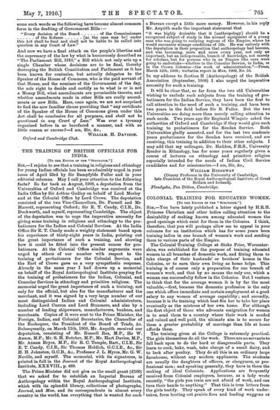THE TRAINING OF BRITISH OFFICIALS FOR INDIA.
go THE EDITOR OF THE " SPECTATOR."]
Silt,-I rejoice to see that a training in religions and ethnology for young Indian officials has been so admirably urged in your issue of April 23rd by Sir Bampfylde Fuller and in your editorial columns. May I call your attention to the following facts ? So far back as August, 1908, a deputation from the Universities of Oxford and Cambridge was received at the India Office by Sir Arthur Godley on behalf of Lord Morley and at the Colonial Office by Lord Crewe. The deputation consisted of the two Vice-Chancellors, Dr. Farnell and Mr Marrett, representing Oxford ; Sir E. T. Candy, C.I.E., Dr. Duckworth, and myself, representing Cambridge. The object of the deputation was to urge the imperative necessity for giving some training in religions and ethnology to the pro- bationers for the Indian and Colonial Services. At the India Office Sir E. T. Candy made a weighty statement based upon his experience of thirty-eight years in India, pointing out the great importance of such a training, and showing how it could be fitted into the present course for pro- bationers. At the Colonial Office similar arguments were urged by others of our number with respect to the training of probationers for the Colonial Service, and the Earl of Crewe gave us a very sympathetic response. Already in the same year I had drawn up a memorial on behalf of the Royal Anthropological Institute praying for the training of probationers for the Indian, Colonial, and Consular Services in ethnology and primitive religions. The memorial urged the great importance of such a training, not only for the official, but also for the manufacturer and the merchant, and it was signed by a very large number of our most distinguished Indian and Colonial administrators, including Lord Curzon and Lord Stanmore, and also by a number of leading shipowners, manufacturers, bankers, and merchants. Copies of it were sent to the Prime Minister, the Foreign, Indian, and Colonial Secretaries, the Chancellor of the Exchequer, the President of the Board of Trade, &c. Subsequently, on March 11th, 1909, Mr. Asquith received our deputation, consisting of Mr. Russell Rea, M.P., Sir W. Anson, M.P., Mr. S. H. Butcher, M.P., Mr. Hart Davies, M.P., Mr. Annan Bryce, M.P., Sir R. C. Temple, Bart., C.I.E., Sir E. T. Candy, C.I.E., Sir Thomas Holdich, G.C.LE., &c., Sir H. H. Johnston, G.C.B., Bw., Professor J. L. Myres, Mr. G. W. Neville, and myself. The memorial, with its signatures, is printed in full in the Journal of the Royal Anthropological Institute, XXXVIII., p. 489.
The Prime Minister did not give us the small grant (£500) that we asked for to establish an Imperial Bureau of Anthropology within the Royal Anthropological Institute, which with its splendid library, collections of photographs, Journal, and Mom, and its correspondents in almost every country in the world, has everything that is wanted for such a Bureau except a little more money. However, in his reply Mr. Asquith made the important statement that
" it was highly desirable that it [anthropology] should be a recognised subject of study in the normal equipment of a young man who was going to outlying regions of the Empire, where he would encounter strange conditions of life. He was entirely with the deputation in their proposition that anthropology had become, and was becoming, more and more every year, not only an important, but an indispensable, branch of knowledge, not merely for scholars, but for persons who in an Empire like ours were going to undertake—whether in the Consular Service, in India, or in the Crown Colonies—the work of administration."—Times, March 12th, 1909; verbatim report in Man, 1909, No. 55.
In my address to Section H (Anthropology) of the British Association (September, 1908) I also urged the imperative necessity for such a training.
It will be clear that, so far from the two old Universities wishing to exclude such subjects from the training of pro- bationers for the Indian Service, they have been the first to call attention to the need of such a training, and have been two years in the field before Sir B. Fuller. But the two Universities are doing more than merely calling attention to such needs. Two years ago Sir Reginald Wingate asked the authorities of Oxford and Cambridge if they would give such training to probationers for the Soudan Service. Both Universities gladly assented, and for the last two academic years probationers for the Soudan have received, and are
receiving, this training in addition to their other subjects. I may add that my colleague, Dr. Haddon, F.R.S., University Reader in Ethnology, has for some years regularly given a course of lectures on ethnology and primitive religion especially intended for the needs of Indian Civil Service candidates and for missionaries.—I am, Sir, Ste.,
WILLIAM RIDGEWAY (Disney Professor in the University of Cambridge, late President of the Royal Anthropological Institute of Great Britain and Ireland).
Flendyshe, Fen Ditton, Cambridge.










































 Previous page
Previous page